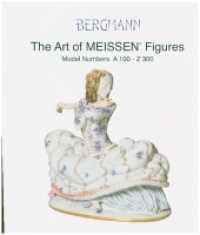- ホーム
- > 洋書
- > 英文書
- > Politics / International Relations
Full Description
Recognition is often considered a means to de-escalate conflicts and promote peaceful social interactions. This volume explores the forms that social recognition and its withholding may take in asymmetric armed conflicts, examining the risks and opportunities that arise when local, state, and transnational actors recognise, misrecognise, or deny recognition of armed non-state actors.
By studying key asymmetric conflicts through the prism of recognition, it offers an innovative perspective on the interactions between armed non-state actors and state actors. In what contexts does granting recognition to armed non-state actors foster conflict transformation? What happens when governments withhold recognition or label armed non-state actors in ways they perceive as misrecognition? The authors examine the ambivalence of recognition processes in violent conflicts and their sometimes-unintended consequences. The volume shows that, while non-recognition prevents conflict transformation, the recognition of armed non-state actors may produce counterproductive precedents and new modes of exclusion in intra-state and transnational politics.
Contents
Part I: Recognition of armed non-state actors: Concepts, theory, history
1 Recognising armed non-state actors: Risks and opportunities for conflict transformation - Maéva Clément, Anna Geis, and Hanna Pfeifer
2 The historical mapping of armed groups' recognition - Stephan Hensell and Klaus Schlichte
Part II: Recognition during armed conflicts
3 Labelling conflict groups in Nigeria: A comparative study of Boko Haram, Niger Delta, IPOB, and Fulani Militia - Michael Nwankpa
4 'Al-Shabaab is part of us': Endogeneity and exogeneity in the struggle for recognition in Somalia - Harmonie Toros and Arrliya Sugal
5 Shifting recognition orders: The case of the Islamic State - Christoph Günther and Tom Kaden
Part III: Recognition in conflict stalemates
6 The PKK's zig-zag in its global quest for recognition - Mitja Sienknecht
7 Recognition, respect, and identity in the discourse of China's Uyghur problem - Chien-peng Chung
8 Recognition dynamics and Lebanese Hezbollah's role in regional conflicts - Hanna Pfeifer
Part IV: Recognition in mediation and peace processes
9 Ripe through recognition? The case of the Provisional Irish Republican Army - Carolin Görzig
10 Norms and recognition in mediation processes: Promoting inclusivity in the mediation of the Intergovernmental Authority on Development in South Sudan - Jamie Pring
11 Mutual recognition in the context of contested statehood: Evidence from Tumaco, Colombia - Jan Boesten and Annette Idler
Part V: Practising recognition: Concluding outlook
12 From rebels to violent extremists: Evolving conflict trends and implications for the recognition of armed non-state groups - Véronique Dudouet
13 Recognition of armed non-state actors: What we have learned and what lies ahead - Harold Trinkunas
Index







